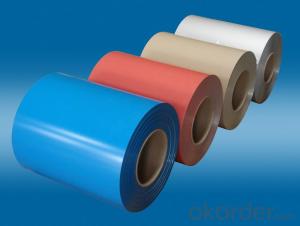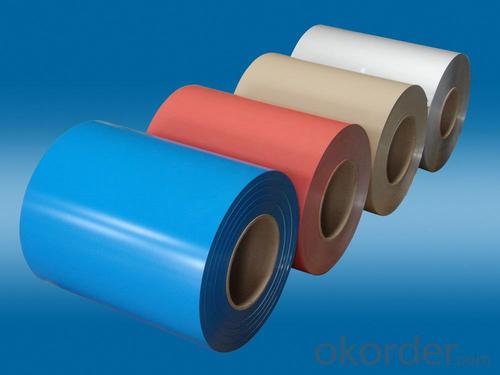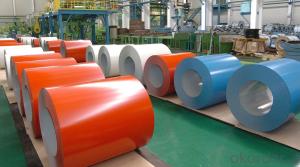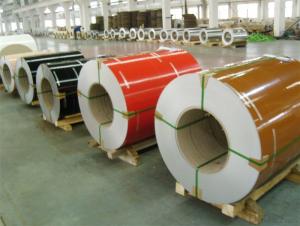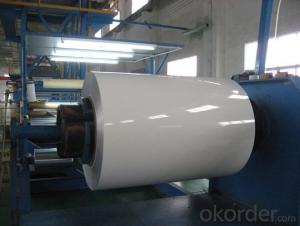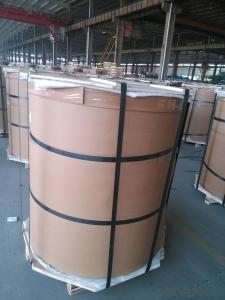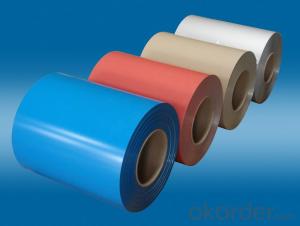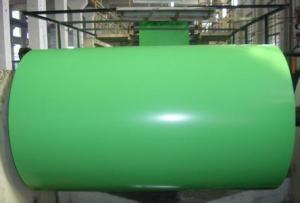Aluminum Coil 3003 AA1050 Prepainted Aluminium Coils Used for Construction
- Loading Port:
- Shanghai
- Payment Terms:
- TT OR LC
- Min Order Qty:
- 3 m.t.
- Supply Capability:
- 10000 m.t./month
OKorder Service Pledge
OKorder Financial Service
You Might Also Like
Specification
1.Structure of AA1050 Prepainted Aluminium Coils Used for Construction Description
AA1050 Prepainted Aluminium Coils Used for Construction are widly used in decoration field. For the painting, it depends on the using evironment. If you use in the open air, we recommend the PVDF coated aluminium coils. This kind of painting can last 15-20 years. If you use in the room, we recommend PE coated aluminium coils. The price is much more competitive.
Direct Continuous Aluminium Foil Stock in Coil is one semi-finished aluminium material. This strip can be rolled down to aluminium foil.The final thickess can be 5-20 microns. Aluminium foil is soft, ductile and with a silver-white luster which can be widely used in a large scare of fields.
2.Main Features ofAA1050 Prepainted Aluminium Coils Used for Construction
• Superior quality of raw material
• Reasonable and stable chemical composition
• Accurate tolerance
• Goode mechanical property
3.AA1060 Prepainted Aluminium Coils Used for Construction Images
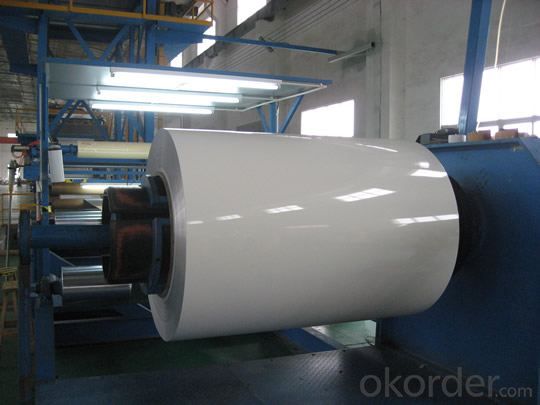
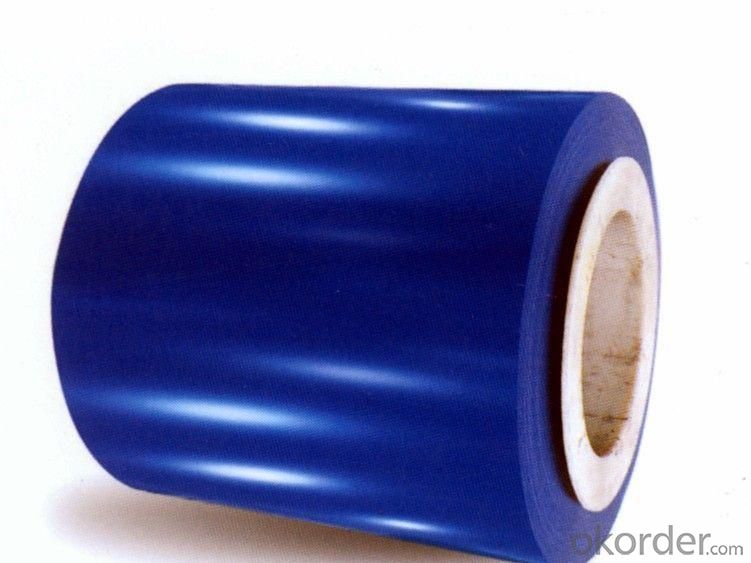
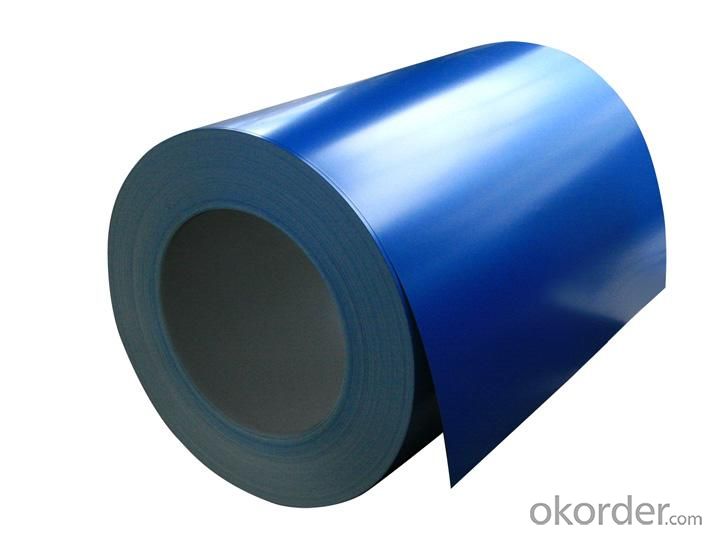
4.AA1050 Prepainted Aluminium Coils Used for Construction Specification
Alloy | AA1050 |
Temper | H14,H16,H18,H22,H24,H26,H32,O/F |
Thickness | 0.03mm-3.0mm |
Width | 30mm-1700mm |
Coating | PE,PVDF,Epoxy |
Painting Thickness | Standard 16-25 Mic, max 40 Mic |
Color | According to RAL colors or customers' samples |
Standard | GB/T 17748-1999 |
5.FAQ:
What is the quality standard?
---Usually our standard is GB3880-2006
What is the largest width?
---It is 2000mm
What is the MOQ?
---Usually we can accept 80 tons.
- Q: Can aluminum coils be used for signage and display applications?
- Yes, aluminum coils can be used for signage and display applications. Aluminum is a versatile and lightweight material that is widely used in the signage industry. Aluminum coils can be easily formed into various shapes and sizes, making them suitable for a variety of signage and display applications. Aluminum coils are commonly used for outdoor signs, such as billboards, building signs, and traffic signs, due to their excellent weather resistance and durability. They can withstand harsh weather conditions, including rain, snow, and UV exposure, without rusting or fading. This makes them a reliable choice for long-lasting signage. Additionally, aluminum coils can be coated with a variety of finishes, such as paint or powder coating, to enhance their appearance and provide additional protection against corrosion. This allows for customization and branding options, making aluminum coils suitable for both functional and decorative signage. In terms of display applications, aluminum coils can be used to create exhibition stands, trade show displays, retail displays, and various other promotional materials. Their lightweight nature makes them easy to transport, assemble, and disassemble, which is beneficial for portable displays. Furthermore, aluminum coils can be easily printed on or laminated, allowing for the incorporation of graphics and visuals to attract attention and convey messages effectively. Overall, aluminum coils are a versatile and durable material that can be used for a wide range of signage and display applications. Their weather resistance, customizable finishes, and lightweight properties make them a popular choice in the industry.
- Q: Are there any health risks associated with aluminum coils?
- Aluminum coils provoke some concerns due to their potential health risks. Coils made of aluminum are commonly utilized in the construction of air conditioning and refrigeration systems. However, when aluminum comes into contact with certain acids, like those present in some cooling agents and cleaning solutions, it can corrode and release aluminum ions into the surrounding air. The inhalation of these aluminum ions may entail health risks, especially for individuals with respiratory conditions or allergies. Moreover, there have been reports indicating a possible connection between aluminum exposure and certain health problems, such as Alzheimer's disease and breast cancer. Nevertheless, scientific research on this association remains inconclusive and ongoing. It is important to acknowledge that aluminum is a naturally occurring element that can be found in many foods, water sources, and even the air we breathe. Additionally, it is employed in various consumer products, including cookware and food packaging. To minimize potential health risks, it is advisable to ensure the proper maintenance and cleaning of air conditioning and refrigeration systems to prevent the accumulation of corrosive substances. Changing air filters regularly and utilizing appropriate cleaning solutions can aid in reducing the likelihood of aluminum corrosion. Additionally, individuals with pre-existing respiratory conditions or allergies may want to consider consulting with a healthcare professional to determine any specific precautions they should take.
- Q: This question asks for a comparison between aluminum coil and iron coil, highlighting their distinct properties and uses.
- <p>Aluminum coil and iron coil differ in several aspects. Aluminum coil is lightweight, corrosion-resistant, and has excellent electrical and thermal conductivity, making it ideal for electrical wiring, heat sinks, and food packaging. Iron coil, on the other hand, is heavier, stronger, and more durable, commonly used in construction, automotive, and heavy machinery due to its high tensile strength. Iron also has magnetic properties, useful in applications like transformers and electromagnets. While aluminum is non-magnetic, it is more cost-effective and has better recyclability compared to iron.</p>
- Q: Is it possible to use a soldering iron to fix a damaged or broken aluminum coil?
- <p>Using a soldering iron to repair an aluminum coil is not typically effective. Aluminum has a high thermal conductivity and doesn't bond well with solder, making it difficult to create a strong joint. Instead, consider using specialized aluminum welding techniques or brazing, which involves using a filler metal with a melting point higher than the base metal. For small repairs, you might also explore the use of aluminum repair epoxy or other adhesives designed for metal bonding. Always ensure to follow safety precautions and consult with a professional if the repair is complex or if the coil is part of a critical system.</p>
- Q: What are the different types of surface coatings for aluminum coils?
- Aluminum coils can be treated with various surface coatings, each serving different purposes. These coatings safeguard the aluminum against corrosion, improve its appearance, and enhance its durability. The most common surface coatings for aluminum coils are as follows: 1. Polyester: Polyester coatings are widely favored for their ability to retain color and resist fading. They provide a smooth, glossy finish and are commonly employed in architectural applications. 2. Polyvinylidene Fluoride (PVDF): PVDF coatings are highly durable and weather resistant. They exhibit exceptional resistance to UV radiation, chemicals, and abrasion, making them suitable for outdoor use and harsh environments. 3. Epoxy: Epoxy coatings possess good adhesion and chemical resistance. They find frequent application in industrial settings where corrosion protection is vital, such as chemical processing plants and marine environments. 4. Polyurethane: Polyurethane coatings are renowned for their durability and resistance to abrasion. They are often utilized in high-traffic areas or applications where the aluminum surface is subject to frequent contact or wear. 5. Acrylic: Acrylic coatings offer reliable weather resistance and color retention. They provide a smooth, glossy finish and are commonly used in architectural and decorative applications. 6. Plastisol: Plastisol coatings, a type of vinyl coating, exhibit excellent corrosion resistance and flexibility. They are frequently employed in applications where the aluminum surface must withstand bending or forming without cracking or peeling. It is essential to consider that each coating type has its own unique properties and advantages. The selection of the coating will depend on specific application requirements, including the desired level of corrosion resistance, aesthetic preferences, and environmental conditions.
- Q: Can aluminum coils be painted for custom designs?
- Yes, aluminum coils can be painted for custom designs. Aluminum is a versatile material that can be coated with various paints and finishes, allowing for a wide range of custom design options.
- Q: I'm trying to cast aluminum using plaster and i was wondering if any one know how much the plaster has to be baked and how to tell if the plaster is dried fully and ways to do it. thx
- Plaster releases water at two points - in ordinary or accelerated drying it loses the water needed for setting and stops feeling cool and feels dry. If it is heated past 900F it loses chemically bound water and may fall apart. Aluminum melts at several hundred degrees higher than this and if the mold is intended to hold a mass of aluminum is is likely to destroy the mold. If the aluminum casting is fairly flat less of a problem. The common method for dealing with this is to add 50% silica flour (bad for lungs warning) to the dry plaster when making the mold. Then the mixed material mold can be used and preheated to take materials at least up to fused/molten glass, although the mold is commonly lost (not reusable) at these temps and just barely holds together.
- Q: need to know the procedure for removal of aluminum windows with brick trim
- I removed all of mine from the inside, not that this will work for you. I removed all of the inside wood pieces holding the window, there were no pieces on the bottom. If there is a nailing fin, you may now cut this from the inside. If these windows replaced other windows in the past, or are not original to the house, there may be no fin at all, there could be screws or they may just all be held in by the trim, you will find out. If the windows are operable, you may be able to at least get the operable piece out, making the whole thing lighter and less likely to break all over the place. If you do not mind broken glas, you can break the old one and the frame will sorta crumple for you, making it easier to pull out. When you slip the new ones in, the can go in tight to whatever was holding the other windows. If you have all of your interior trim pieces ready (they may need to be a different width than the original if the new windows are thicker) and make sure you caulk it to death first ( on the top and two sides of the building where it will squish up against it), then shove it in, use some shims to level it (oh, do NOT buy windows the EXACT size of the opening, I believe at least 1/4 to 1/2 shy is best ot allow for shimming, leveling, and squaring up - I bought one like that, WHAT A NIGHTMARE), caulk inside the top and two sides, push your trim into place and shoot a few finish nails in. Go around and wipe off all excess caulk with a damp cloth.
- Q: Some properties of aluminum are summarized in the following list.normal melting point 658°C heat of fusion 3.95 kJ/g normal boiling point 2467°C heat of vaporization 10.52 kJ/g specific heat of the solid 0.902 J/g°C Calculate the quantity of energy required to heat 1.58 mol of aluminum from 33°C to its normal melting point? In KJCalculate the quantity of energy required to melt 1.02 mol of aluminum at 658°C? In KJCalculate the amount of energy required to vaporize 1.02 mol of aluminum at 2467°C? In KJ
- Calculate the quantity of energy required to heat 1.58 mol of aluminum from 33°C to its normal melting point in KJ- 1.58 mol x 26.98 g/mol x 0.902 J/g°C x (658 - 33)°C x 1 kJ/1000 J = 24.03 kJ Calculate the quantity of energy required to melt 1.02 mol of aluminum at 658°C In KJ- 1.02 mol x 26.98 g/mol x 3.95 kJ/g = 108.7 kJ Calculate the amount of energy required to vaporize 1.02 mol of aluminum at 2467°C In KJ- 1.02 mol x 26.98 g/mol x 10.52 kJ/g = 289.5 kJ
- Q: Are there any limitations to using aluminum coils?
- Yes, there are several limitations to using aluminum coils. Firstly, aluminum coils are more expensive compared to other coil materials such as copper. This can be a limiting factor for individuals or businesses with budget constraints. Secondly, aluminum coils have lower thermal conductivity than copper coils. This means that they are less efficient at transferring heat, which can result in decreased performance in some applications. Additionally, aluminum is more susceptible to corrosion and oxidation compared to other materials. This can be a limitation in environments that are highly corrosive, such as coastal areas or industrial settings. Furthermore, aluminum coils are generally not suitable for high-pressure applications. They are more prone to leaks or failures under high pressure, which can limit their use in certain HVAC systems or refrigeration units. Lastly, aluminum coils are not as malleable as copper coils, making them more difficult to work with during installation or repair. This can lead to increased labor costs or potential damage to the coils during handling. Overall, while aluminum coils have their advantages such as being lightweight and environmentally friendly, they also have limitations that need to be considered based on the specific application and requirements.
Send your message to us
Aluminum Coil 3003 AA1050 Prepainted Aluminium Coils Used for Construction
- Loading Port:
- Shanghai
- Payment Terms:
- TT OR LC
- Min Order Qty:
- 3 m.t.
- Supply Capability:
- 10000 m.t./month
OKorder Service Pledge
OKorder Financial Service
Similar products
Hot products
Hot Searches
Related keywords
